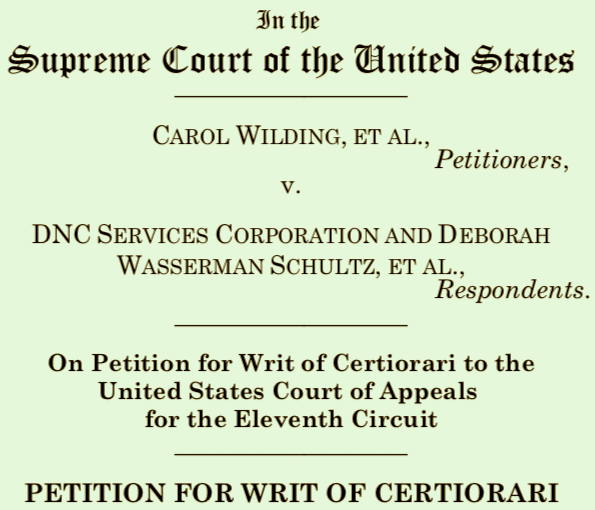DNC Fraud Lawsuit Plaintiffs Petition Supreme Court
•
Lawyers are highlighting the High Court’s role in previously deciding on Jim-Crow era practices that excluded African-Americans from participating in Democratic primaries in the South, reports Elizabeth Vos.

U.S. Supreme Court building. (Joe Ravi, CC BY-SA 3.0, via Wikimedia Commons)
By Elizabeth VosSpecial to Consortium News
 Lawyers for the plaintiffs in the DNC Fraud Lawsuit filed a petition last week with the Supreme Court to review the suit’s earlier dismissal in the 11th Circuit. The move is the latest development in the suit, which was initially filed in 2016 against the Democratic National Committee and former DNC Chairwoman Debbie Wasserman Schultz by members of the Democratic Party and supporters of Senator Bernie Sanders.
Lawyers for the plaintiffs in the DNC Fraud Lawsuit filed a petition last week with the Supreme Court to review the suit’s earlier dismissal in the 11th Circuit. The move is the latest development in the suit, which was initially filed in 2016 against the Democratic National Committee and former DNC Chairwoman Debbie Wasserman Schultz by members of the Democratic Party and supporters of Senator Bernie Sanders.
The suit was launched in the wake of WikiLeaks revelations of the DNC’s bias in favor of former Secretary of State Hillary Clinton against Senator Bernie Sanders and was initially dismissed in August 2017 on jurisdictional grounds with a subsequent appeal to the 11th Circuit dismissed in October last year.
The petition filed by Elizabeth and Jared Beck says that though the Eleventh Circuit upheld the district court’s dismissal, they “found the DNC donor plaintiffs (although not the Sanders donors) did satisfy the elements … for the fraud-type claims.”
That has allowed the Becks to appeal to the Supreme Court. Elizabeth Beck told Consortium News: “Appeals to the Supreme Court are not automatic. You do not get to appeal just because you lost in the Court of Federal Appeals. The Supreme Court has to accept your appeal. That’s what a Petition for a Writ of Certiorari is—a request to be allowed to appeal to the highest court. And that is what we have filed. The odds are definitely not in our favor: according to this blog, of the 7,000 to 8,000 cert petitions filed each term, the court grants certiorari and hears oral argument in only about 80.”
Asked when a response to their petition could be expected, Beck replied that “the Supreme Court has canceled oral argument due to Covid-19, so I cannot say at this time when we can expect a ruling.”
 Elizabeth Beck’s husband and law partner, Jared Beck, also representing the plaintiffs in the case, added: “In ordinary times, the Supreme Court justices have weekly meetings with their clerks to discuss whether or not to accept the various certiorari petitions that are filed. I don’t know whether the Court is continuing to have these meetings at the moment, but it ordinarily takes about a month to two months before a petition is circulated for consideration by the Court.”
Elizabeth Beck’s husband and law partner, Jared Beck, also representing the plaintiffs in the case, added: “In ordinary times, the Supreme Court justices have weekly meetings with their clerks to discuss whether or not to accept the various certiorari petitions that are filed. I don’t know whether the Court is continuing to have these meetings at the moment, but it ordinarily takes about a month to two months before a petition is circulated for consideration by the Court.”
Addressing election interference, the petition filed by the Becks cites the 2-year investigation led by Special Counsel Robert Mueller investigation into alleged Russian interference, which became the singular focus of Establishment media from November 2016 onwards. In contrast, as the Becks note, the documented election interference forming the basis of the DNC Fraud Lawsuit has seen no investigation or prosecution, with their suit standing as the single exception. The Becks said:
“No official investigations or criminal proceedings have been undertaken as a result of the DNC’s failure to maintain neutrality during the 2016 Democratic primaries; no one has gone to prison or been held accountable in a court of law or any other forum. Indeed, the instant civil action embodies the lone significant attempt to hold the DNC accountable for its biased conduct, and it was brought in the name of Sanders supporters who, as a class, contributed over $228 million to a campaign that the DNC was secretly working to undermine all along.”
In order to better understand the content of the Beck’s petition, it is important to revisit key aspects of the DNC Fraud Lawsuit litigation, including arguments launched by DNC and Wasserman Schultz’s defense counsel.
Primary Rigging and First Amendment
During the DNC Fraud Lawsuit’s proceedings, defense counsel filed a response brief claiming that primary rigging is protected by the First Amendment, arguing that, “To recognize any of the causes of action that Plaintiffs allege based on their animating theory would run directly contrary to long-standing Supreme Court precedent recognizing the central and critical First Amendment rights enjoyed by political parties, especially when it comes to selecting the party’s nominee for public office.”

Bernie Sanders supporters at a town meeting in Phoenix, Arizona, July 2015. (Gage Skidmore via Flickr)
The Becks’ recently filed petition hits back against this argument on a number of fronts, contending that:
“To this day, the Court’s jurisprudence structures a political system in which the preferences of voters – rather than gaining expression in a free market of parties, candidates, and ideas – are mediated through the twin apparatuses of the Democratic and Republican parties, which conduct primaries and caucuses to determine the nominees who will ultimately square off in the general election for federal office. As such, the two parties are now custodians of what the Court has identified as the most “precious” of rights: “that of having a voice in the election of those who make the laws under which, as good citizens, we must live.”The Court has readily characterized the parties as private associations protected by the First and Fourteenth Amendments in the exercise of freedom of speech and freedom of association…The Court has also recognized the governmental function of parties, holding that the Fifteenth Amendment prevents them from excluding citizens from participating in primary elections on account of race.”
The suit showed that not only did the Democratic Party view its own bias as protected by the First Amendment, but that it also considers its chartered promise of impartiality the equivalent of the kind of political campaign promise that political figures make and break on a routine basis. In a response brief, DNC representatives claimed that the DNC had no established fiduciary duty “to the Plaintiffs or the classes of donors and registered voters they seek to represent.”
Defense counsel also claimed that Sanders supporters knew the process was rigged. As the Becks argue:
“This case now presents a much-needed, golden opportunity for the Court to clarify the role of parties in the U.S. political system while addressing the question of whether the DNC has a legally enforceable duty to run the nominating process in a fair and even handed manner – as its charter says it does.”Only this Court can conclusively pass on the legality of the DNC’s conduct, situate it within the larger framework of the nation’s political institutions, and thereby provide a judicious response to the widespread and growing perception that the DNC and its leadership have robbed – and will continue to rob – citizens of their voice in government with impunity.”
High Court Role on Jim-Crow Era Practices
The petition highlights the role of the Supreme Court in previously deciding on Jim-Crow era practices that excluded African-Americans from participating in Democratic primaries in the South. The petition states:
“In overruling Grovey, the Smith case recognized that for the right to vote to have meaning, it could not be nulified [sic] by a state through casting its electoral process in a form which permits a private organization to practice racial discrimination in the election. Constitutional rights would be of little value if they could be thus indirectly denied.”
Elizabeth Beck told Consortium News: “President Franklin D. Roosevelt said that the only thing we have to fear is fear itself, and the legal team here is continuing to methodically work on our cases and tidy matters up for our clients. It’s what we have always done, and what we will continue to do, until we cannot. Good luck to everyone.”
As Jared Beck recognized in his book “What Happened to Bernie Sanders,” the outcome of the legal proceedings in the DNC Fraud Lawsuit should not overshadow the value of what has already transpired in the suit’s litigation process. Beck writes: “Because the case was dismissed on preliminary grounds and well before proceeding to the merits – and because appellate courts rarely reverse cases – it is unlikely that my client’s claims will ever be tried before a jury.”
The sentiments expressed by the party’s own defense counsel indicate that the DNC sees the democratic process in its nomination procedure as meaningless, with the real decisions determined by party insiders. Establishment media has hardly held them to account. DNC cheerleaders in the corporate press have not only ignored the fraud perpetrated by the DNC in 2016, but some have argued that “Too Much Democracy is Bad for Democracy.”
Drowned in the white noise of constant Covid-19 coverage, the latest development in the DNC Fraud Lawsuit is critical not only in terms of understanding a snapshot of election history, but in providing clarity regarding current and future presidential elections.
From Senator Joe Biden’s primary victories in states where he failed to so much as open a campaign office, to consistent disparities in exit poll data compared with official vote-counts that repeatedly favored Biden in the official result, the DNC Fraud Lawsuit stands as pivotal evidence of the DNC’s real attitude towards its donors and primary voters.
Regardless of the legal outcome in this case, the proceedings have already served as invaluable evidence of the rot in the democratic system in the United States.
Elizabeth Vos is a freelance reporter and co-host of CN Live.



Geen opmerkingen:
Een reactie posten